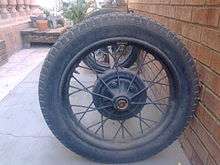tyre
See also: Tyre
English
Etymology 1
The Oxford English Dictionary suggests that the word derives from attire, while other sources suggest a connection with the verb to tie. The spelling tyre is used in the United Kingdom, Ireland, Australia, and New Zealand after being revived in the 19th century. Both tyre and tire were used in the 15th and 16th centuries. The United States did not adopt the revival of tyre, and tire is the only spelling currently used there and in Canada.

An antique tyre
Alternative forms
- (US, Canada) tire
Noun
tyre (plural tyres)
- (British spelling, Irish, South African, Australian and NZ spelling) The ring-shaped protective covering around a wheel which is usually made of rubber or plastic composite and is either pneumatic or solid.
Derived terms
- pneumatic tyre
- spare tyre
- tyre barrier
- tyre lever
Translations
wheel covering
|
|
Verb
tyre (third-person singular simple present tyres, present participle tyring, simple past and past participle tyred)
- (transitive) To fit tyres to (a vehicle).
- 1929, The Listener (issues 41-50, page 552)
- The circular iron platform over there is used in the task of tyring the wheels, a warm job, too, by the way.
- 1929, The Listener (issues 41-50, page 552)
Etymology 2
From Tamil.
Etymology 3
Noun
tyre (uncountable) (obsolete)
- attire
- (Can we find and add a quotation of Edmund Spenser to this entry?)
Verb
tyre (third-person singular simple present tyres, present participle tyring, simple past and past participle tyred) (obsolete)
- To adorn.
References
- tyre in Webster’s Revised Unabridged Dictionary, G. & C. Merriam, 1913.
Albanian
Alternative forms
- tyne [tynɛ] (Gheg)
Declension
declension of i tyre
| singular | plural | |||
|---|---|---|---|---|
| masculine | feminine | masculine | feminine | |
| nominative | i tyre | e tyre | e tyre | e tyre |
| accusative | e tyre | e tyre | e tyre | e tyre |
| genitive/dative/ablative | të tyre | së tyre | të tyre | të tyre |
Danish
This article is issued from
Wiktionary.
The text is licensed under Creative
Commons - Attribution - Sharealike.
Additional terms may apply for the media files.